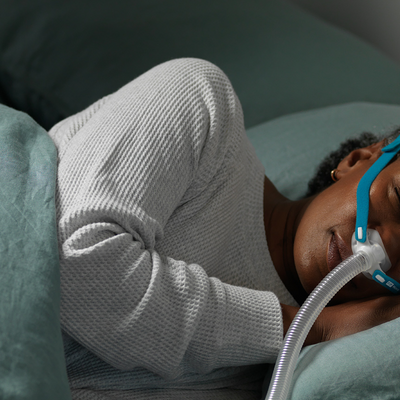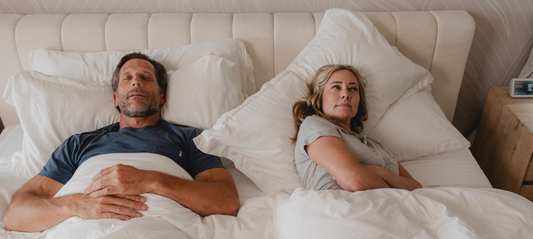Written by Nancy Kirk
November 18, 2024
Gut health is a popular subject with health advocates these days. So what exactly is gut health—and how does it relate to sleep? Gut health revolves around the balance of bacteria in your digestive system. You’ll experience improved mood, energy, and sleep quality when this bacteria is balanced.
Unfortunately, poor gut health can cause you to feel sluggish, heavy, and constantly tired. It can also affect your sleep quality, especially if you already have a condition like sleep apnea.
Because sleep apnea causes disrupted breathing patterns during sleep, it makes sense that its symptoms can be worsened by poor gut health, which also affects sleep. You may feel extra tired, lethargic, and heavy if you experience poor gut health and sleep apnea.
When you prioritize good gut health, you’ll likely experience better quality sleep, longer-lasting energy, and focus levels. Let’s look at how your gut bacteria can impact sleep quality and highlight easy-to-implement tips for improving symptoms of both.
How Digestive Health Impacts Restful Sleep
Your gut microbiome produces melatonin, the hormone that regulates sleep cycles. When your microbiome functions correctly, it releases the right amount of this sleep hormone, allowing you to fall asleep more quickly and stay asleep. This is why poor gut health often equates to poor sleep and low energy levels.1
When it comes to sleep apnea, poor gut health can worsen your existing fatigue symptoms. At the same time, poor sleep caused by sleep apnea can worsen gut health. This creates a vicious cycle where the conditions exacerbate each other—often leading to sleep deprivation. Managing gut health and sleep apnea through prescribed treatment is crucial to overall well-being.
Signs of Poor Gut Health
In addition to fatigue, there are other ways to know you might have poor gut health. These symptoms can point to gut imbalances that affect digestion and can worsen sleep apnea symptoms. Here are other signs of poor gut health to look out for:
- Acid reflux or heartburn
- Irregular bowel movements (constipation or diarrhea)
- Excessive gas
- Abdominal pain or cramping
- Fatigue or low-energy
- Food intolerances or sensitivities
- Frequent sugar cravings
- Skin issues (e.g., acne, eczema, or rashes)
- Bad breath (halitosis)
Research Linking Sleep Apnea to Gut Health
Researchers are exploring the link between sleep apnea and gut health, particularly its role in blood pressure regulation. In one study, they found that when sleep apnea was combined with a high-fat diet, it disrupted the balance of bacteria in the gut. This imbalance was closely tied to significant increases in blood pressure. It also highlights the vital link between sleep apnea and cholesterol.
To test the connection, gut bacteria from rats with sleep apnea on a high-fat diet were transplanted into healthy rats. (And yes, rats can have sleep apnea!) The healthy rats, previously unaffected, developed high blood pressure after the transplant. These findings highlight the critical role of gut health in conditions like sleep apnea and suggest that addressing gut imbalances could be a potential strategy for managing related health risks.2
Dietary Tips to Support Gut Health and Potentially Improve Sleep Apnea
To support gut health and potentially improve sleep quality, it’s essential to consider a healthy diet. These dietary changes can create a positive shift in gut health, which may help mitigate sleep apnea symptoms over time. Here are some foods you may want to implement into your daily routine:
- Fiber-Rich Foods: Include whole grains, fruits, and vegetables to nourish beneficial bacteria.
- Probiotics and Prebiotics: Foods like yogurt, kimchi, and bananas help support a balanced microbiome.
- Hydration: Drink plenty of water to improve digestion and reduce inflammation.
- Limit Processed Foods: Refined sugars and artificial ingredients can disrupt gut bacteria balance, affecting gut and sleep health.
Lifestyle Adjustments to Improve Gut Health and Sleep Apnea Symptoms
Beyond diet, other lifestyle choices can help improve gut and sleep health:
- Reduce Stress: Chronic stress can disrupt both gut health and sleep patterns. Techniques like meditation, yoga, and deep breathing can help manage stress levels.
- Exercise Regularly: Physical activity supports healthy digestion, reduces stress, and can even improve sleep apnea symptoms by promoting weight loss and muscle tone.
- Establish a Sleep Routine: A regular sleep schedule can support gut health by regulating circadian rhythms, which are essential for optimal digestion and sleep quality.
A Holistic Approach to Managing Sleep Apnea
The emerging link between gut health and sleep apnea highlights the importance of a holistic approach to managing sleep disorders. By supporting gut health through diet and lifestyle changes, you may be able to reduce your sleep apnea symptoms, improving overall health.
If you suspect sleep apnea may be affecting your quality of life, taking the first step with a home sleep test can provide insights into your sleep health. At Lofta, we offer a range of solutions, including home testing, advanced CPAP devices, and comprehensive support to help you achieve better, healthier sleep. Visit our website to start your journey toward restful sleep and improved well-being.
When to Seek Professional Support
If you experience persistent digestive issues alongside sleep apnea symptoms, consider consulting your doctor—or ask for a referral for a healthcare professional who specializes in sleep and gut health. Sleep specialists, gastroenterologists, and nutritionists can work together to offer a comprehensive approach to managing both issues.
Manage Your Sleep Apnea with Lofta
Whether you haven’t yet been diagnosed with sleep apnea or are already using your CPAP machine, it’s crucial to prioritize your sleep health. With Lofta, our sleep apnea treatment process is simple. We highly recommend ordering our at-home sleep test if you haven't been diagnosed and are struggling with low-quality sleep and fatigue. Our test gets delivered straight to your door, it’s super easy to use, and you don’t even have to leave the house!
If you’re already treating your sleep apnea, keep us in mind next time you have to order a new mask or sleep apnea supplies, like CPAP travel batteries or cleaning supplies.
Contact Us Today
1 (800) 698-8000 | sleep@lofta.com
SOURCES:










































